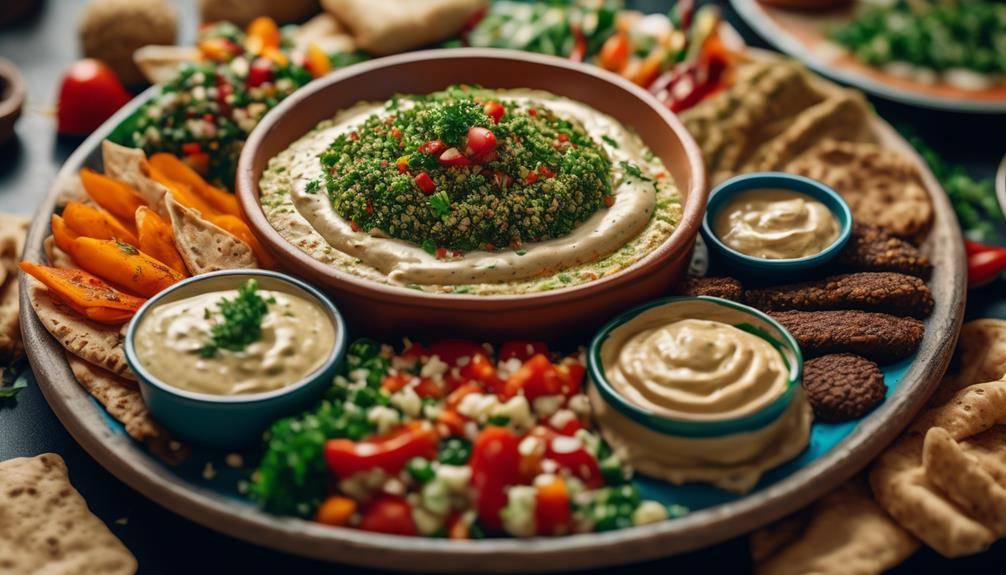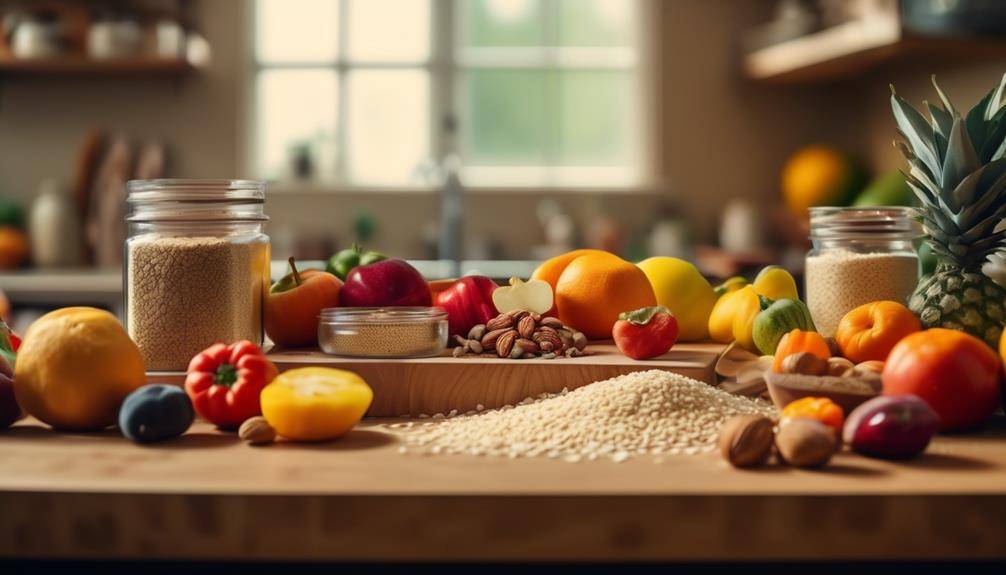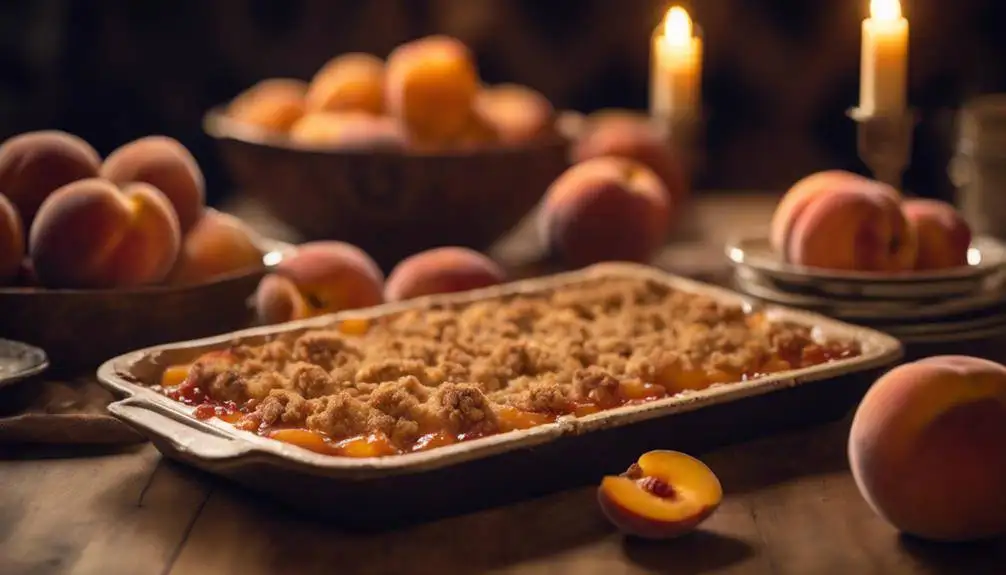The Best Healthy Lebanese Food Options

Are you tired of the same old boring salads and tasteless healthy options? Well, let me introduce you to the vibrant world of Healthy Lebanese Food Options, where healthy eating is an art form. Imagine walking into a bustling Lebanese restaurant, the aroma of freshly baked bread and sizzling grilled meats filling the air.
The colorful array of mezzes, or small plates, spread out before you like a canvas waiting to be explored. But here’s the best part – each dish is not only packed with flavor but also offers a plethora of health benefits. So, if you’re ready to embark on a culinary journey that will tantalize your taste buds and nourish your body, buckle up and get ready to discover the endless possibilities of healthy Lebanese food.
Traditional Lebanese Dips and Spreads
When exploring Lebanese cuisine, one cannot overlook the rich and flavorful array of traditional dips and spreads that are an integral part of the Lebanese dining experience. These dips and spreads are often served as appetizers, known as ‘mezzes’, and are meant to be shared amongst friends and family. One of the most popular traditional Lebanese dips is ‘hummus’, made from mashed chickpeas, tahini, garlic, lemon juice, and olive oil. It is typically enjoyed with warm traditional Lebanese breads, such as ‘pita’ or ‘markouk’, which are soft and perfect for scooping up the creamy hummus.
Another delicious and widely enjoyed dip is ‘baba ganoush’, made from roasted eggplant, tahini, garlic, lemon juice, and olive oil. Its smoky flavor and creamy texture make it a favorite among many Lebanese food enthusiasts. Similar to hummus, baba ganoush is also best enjoyed with traditional Lebanese breads.
In addition to these popular dips, Lebanese cuisine also offers a variety of other flavorful spreads. ‘Labneh’, a strained yogurt cheese, is often served with a drizzle of olive oil and a sprinkle of herbs. It is tangy and creamy, perfect for spreading on bread or dipping fresh vegetables.
To complement these dips and spreads, Lebanese cuisine also incorporates homemade pickled vegetables. These pickles add a tangy and refreshing element to the meal, balancing out the richness of the dips. Commonly pickled vegetables include cucumbers, turnips, and carrots, which are soaked in a brine made from vinegar, water, salt, and spices.
Fresh and Flavorful Salads
Fresh and flavorful salads are a vibrant and nutritious addition to any Lebanese meal. They not only provide a burst of refreshing flavors but also offer a wide range of health benefits. Here are some options to consider:
- Tabouleh: This traditional Lebanese salad is made with fresh parsley, mint, tomatoes, and bulgur wheat. It is tossed with lemon juice and olive oil, creating a zesty and tangy flavor. Tabouleh is packed with vitamins, minerals, and fiber, making it a healthy and filling choice.
- Fattoush: Fattoush is a colorful salad that combines crispy lettuce, cucumbers, tomatoes, radishes, and toasted pita bread. It is dressed with a mixture of olive oil, lemon juice, and sumac, a tangy spice. Fattoush provides a variety of textures and flavors, making it a satisfying and nutritious option.
- Tabbouleh: Tabbouleh is a light and refreshing salad made with fresh herbs, such as parsley and mint, along with tomatoes, onions, and bulgur wheat. It is dressed with a simple yet flavorful combination of lemon juice and olive oil. Tabbouleh is not only delicious but also rich in antioxidants, vitamins, and minerals.
To enhance the nutritional value of your salads, consider adding fresh fruit options like pomegranate seeds, grapes, or oranges. These fruits not only add a burst of sweetness but also provide additional vitamins and antioxidants. Additionally, try experimenting with healthy dressing recipes using ingredients like yogurt, tahini, or avocado instead of heavy cream or mayonnaise.
Incorporating fresh and flavorful salads into your Lebanese meals is a great way to boost your overall health and add a burst of vibrant flavors to your dining experience. So, why not give these options a try and enjoy a nutritious and delicious meal today?
Grilled and Marinated Meats
When it comes to grilled and marinated meats in Lebanese cuisine, there are a few key points to consider. First, the tasty meat marinades used in Lebanese cooking are what give the meats their unique and delicious flavors. Second, the grilling techniques employed by Lebanese chefs result in perfectly cooked and succulent meats. Whether it’s shish kebabs, grilled lamb, or marinated chicken, Lebanese cuisine offers a wide variety of options for meat lovers.
Tasty Meat Marinades
To enhance the flavor of grilled and marinated meats, consider using a variety of tasty meat marinades. These marinades not only add a burst of flavor but also help tenderize the meat, making it juicier and more delicious. Here are three healthy grilling options that you can try:
- Lemon and herb marinade: A mix of fresh lemon juice, garlic, and fragrant herbs like thyme and rosemary can give your meat a tangy and aromatic flavor.
- Yogurt and spice marinade: Yogurt acts as a natural tenderizer while spices like cumin, paprika, and turmeric add a rich and spicy kick to your meat.
- Mediterranean marinade: Combining olive oil, lemon juice, garlic, and a blend of herbs like oregano, basil, and parsley will give your meat a Mediterranean flair.
Grilling Techniques
For perfectly grilled and marinated meats, mastering the right grilling techniques is essential. To achieve those perfect grill marks, start by preheating your grill to a high temperature. This will help sear the meat and lock in its juices. When grilling seafood, it’s important to keep a close eye on the cooking time as seafood cooks quickly and can easily become overdone.
To prevent sticking, oil the grill grates or use a grilling basket. For added flavor, marinate the meats before grilling. This will not only enhance the taste but also tenderize the meat. Remember to let the meat rest after grilling to allow the juices to redistribute, resulting in a more succulent and flavorful dish. Mastering these grilling techniques will elevate your grilled and marinated meats to the next level.
Nutritious Vegetarian Options
If you’re looking for highly nutritious vegetarian options, Lebanese cuisine offers a diverse array of flavorful dishes that will satisfy your taste buds and nourish your body. Lebanese cuisine is known for its use of fresh and wholesome ingredients, making it a great choice for those following a plant-based diet. Here are some nutritious vegetarian options to try:
- Falafel: Made from ground chickpeas, herbs, and spices, falafel is a popular vegetarian dish in Lebanon. It is traditionally deep-fried, but you can also opt for baked or air-fried versions for a healthier twist. Falafel is not only delicious but also a good source of plant-based protein and fiber.
- Tabbouleh: This refreshing salad combines parsley, mint, bulgur wheat, tomatoes, onions, and lemon juice. Tabbouleh is packed with vitamins, minerals, and antioxidants, and it provides a good amount of fiber as well. It makes for a light and nutritious meal or a side dish.
- Moujadara: This comforting dish is made from lentils, rice, and caramelized onions. Lentils are a fantastic plant-based protein source, rich in fiber, vitamins, and minerals. Moujadara is not only satisfying but also budget-friendly and easy to prepare.
Lebanese cuisine offers a wide variety of vegetarian dishes that are both nutritious and delicious. From hearty stews and flavorful salads to savory dips and aromatic rice dishes, there is something for everyone. By incorporating these plant-based protein sources into your diet, you can enjoy the benefits of a vegetarian lifestyle while still enjoying the flavors of Lebanese cuisine.
Wholesome Grain-based Dishes
Looking for nutritious grain-based recipes? Lebanese cuisine offers a wide variety of wholesome grain dishes that will satisfy your taste buds and fuel your body. From traditional dishes like tabbouleh, made with bulgur wheat, to hearty meals like kibbeh, made with cracked wheat, there are plenty of options to choose from. So, why not try incorporating these delicious and nutritious Lebanese grain-based dishes into your diet?
Nutritious Grain-Based Recipes
Grain-based dishes in Lebanese cuisine offer a nutritious and wholesome option for those seeking a balanced and satisfying meal. These dishes not only provide essential nutrients but also deliver a unique and delicious taste. Here are some nutritious grain-based recipes that you can incorporate into your diet:
- Nutritious grain-based breakfasts: Start your day with a hearty bowl of Lebanese oatmeal, made with rolled oats, cinnamon, and topped with nuts and fruits. Another option is manoushe, a traditional Lebanese flatbread topped with za’atar, a flavorful blend of herbs and spices.
- Creative grain-based snacks: Try making kibbeh, a popular Lebanese snack made with bulgur wheat, ground meat, and spices. You can also make falafel using a mixture of chickpeas, herbs, and spices, served with a side of whole wheat pita bread and tahini sauce.
Traditional Lebanese Grain Dishes
Traditional Lebanese grain dishes are a cornerstone of the country’s cuisine, offering a wholesome and flavorful option for those looking to enjoy a nourishing meal. Lebanese cuisine incorporates a variety of grain-based cooking methods, resulting in a diverse range of dishes. One popular Lebanese grain-based breakfast is “foul moudammas,” made with fava beans, olive oil, lemon juice, and spices. Another dish, called “bulgur pilaf,” combines bulgur wheat with aromatic herbs, vegetables, and sometimes meat. Tabouleh, a well-known Lebanese salad, is made with cracked wheat, finely chopped parsley, tomatoes, onions, lemon juice, and olive oil. These dishes showcase the versatility of grains in Lebanese cooking and provide a nutritious option for those seeking a balanced diet.
Healthy Lebanese Soups and Stews
If you’re searching for nutritious and satisfying options, Lebanese cuisine offers a wide variety of healthy soups and stews. These traditional Lebanese dishes are not only delicious but also packed with nutrients that can support your overall well-being. Here are some healthy Lebanese soups and stews that you should consider adding to your diet:
- Lentil Soup: Made with red or green lentils, this soup is a great source of plant-based protein and fiber. Lentils are also rich in iron, folate, and other essential vitamins and minerals. This soup is not only hearty but also helps in maintaining a healthy digestive system.
- Chicken and Vegetable Stew: This flavorful stew combines tender chicken, fresh vegetables like carrots, potatoes, and zucchini, and aromatic herbs and spices. It is a complete meal on its own, providing a good balance of protein, carbohydrates, and fiber. The vegetables in the stew add vitamins, minerals, and antioxidants to support your immune system.
- Bean and Tomato Stew: Made with a variety of beans, tomatoes, onions, and garlic, this stew is a nutritional powerhouse. Beans are an excellent source of plant-based protein, fiber, and complex carbohydrates. They are also low in fat and cholesterol-free. Tomatoes add a burst of flavor and are rich in vitamin C and lycopene, a powerful antioxidant.
Incorporating these healthy Lebanese soups and stews into your diet can provide you with a wide range of nutrients while satisfying your taste buds. So, next time you’re looking for a nourishing and delicious meal, give these traditional Lebanese dishes a try.
Nourishing Seafood Delights
For a nourishing and flavorful option, look no further than the array of seafood delights in Lebanese cuisine. Lebanese cuisine is known for its Mediterranean flavors, and seafood plays a significant role in many traditional dishes. From grilled fish to shrimp kebabs, there are plenty of seafood recipes that will satisfy your taste buds and provide you with essential nutrients.
One popular seafood dish is Sayadiyeh, a flavorful rice and fish dish. It combines fragrant spices like cumin, turmeric, and cinnamon with tender white fish, creating a delicious and wholesome meal. Another favorite is Samak bi Tahini, which features grilled fish smothered in a creamy tahini sauce. The combination of the smoky fish and the tangy tahini creates a mouthwatering dish that is rich in omega-3 fatty acids.
If you prefer shellfish, you can indulge in dishes like Fattoush with Shrimp or Batata Harra with Calamari. Fattoush is a refreshing salad made with crispy vegetables, herbs, and toasted pita bread, topped with succulent grilled shrimp. Batata Harra, on the other hand, is a spicy potato dish that is elevated with the addition of tender calamari.
The Lebanese coastline provides an abundance of fresh seafood, and the cuisine takes full advantage of these bountiful resources. Whether you’re a seafood lover or looking to incorporate more nutritious options into your diet, Lebanese seafood delights offer a delicious and healthy choice. So, why not explore the flavors of the Mediterranean and indulge in some nourishing seafood dishes today?
Delectable Lebanese Desserts
Lebanese cuisine not only offers nourishing seafood delights, but it also boasts an array of delectable desserts that are sure to satisfy your sweet tooth. Lebanese dessert recipes are known for their unique flavors and the use of ingredients like nuts, honey, and rose water. Here are three sweet treats from Lebanon that you must try:
- Baklava: This traditional Lebanese dessert is made with layers of phyllo pastry filled with a mixture of chopped nuts, sugar, and aromatic spices like cinnamon and cardamom. The pastry is then soaked in a sweet syrup made with honey and orange blossom water. The combination of the crunchy pastry and the sweet, nutty filling makes Baklava a truly indulgent treat.
- Knafeh: Knafeh is a popular Lebanese dessert made with shredded phyllo dough, a creamy cheese filling, and a sweet syrup flavored with rose water. The dessert is baked until golden and crispy, and then topped with crushed pistachios for added texture and flavor. The contrast between the crispy dough and the soft, gooey cheese filling makes Knafeh a delight for the senses.
- Maamoul: Maamoul are delicate Lebanese pastries filled with a mixture of dates, pistachios, or walnuts. These bite-sized treats are made with a buttery, semolina-based dough and are often shaped into intricate designs using special molds. Maamoul is typically enjoyed during special occasions and holidays, and they make for a perfect accompaniment to a cup of tea or coffee.
Lebanese desserts are not only delicious but also reflect the rich cultural heritage of Lebanon. Whether you’re a fan of nutty pastries, creamy cheeses, or sweet syrups, there is a Lebanese dessert that will surely satisfy your cravings. So, indulge in these sweet treats from Lebanon and experience the irresistible flavors of Lebanese cuisine.
Healthy Lebanese Food Options; Frequently Asked Questions
Are All Lebanese Dips and Spreads Made With High-Calorie Ingredients?
Lebanese dips and spreads can be made with high-calorie ingredients, but there are healthy alternatives available. Consider options like hummus made with olive oil and yogurt-based tzatziki. These alternatives can provide nutritional value without sacrificing taste.
Are There Any Salads in Lebanese Cuisine That Are Not Typically Considered Healthy?
Salads in Lebanese cuisine vary in nutritional value. While most are healthy, some may contain higher calorie dressings or toppings. It’s important to choose wisely and opt for options with fresh vegetables and lighter dressings.
Are All Grilled and Marinated Meats in Lebanese Cuisine Lean and Low in Fat?
Grilled meat alternatives in Lebanese cuisine can be lean and low in fat, but it depends on the specific dish and cooking method. Lebanese cuisine offers a variety of healthy options, known for their health benefits like olive oil and fresh ingredients.
What Are Some Vegetarian Options in Lebanese Cuisine That Are Not Commonly Known?
Uncover unconventional vegetarian dishes in Lebanese cuisine. Explore healthy twists on traditional recipes. Discover new flavors and textures that will satisfy your taste buds while nourishing your body.
Are There Any Lebanese Desserts That Are Low in Sugar and Calories?
There are indeed low sugar Lebanese desserts that can be a healthier alternative. You can try options like mafroukeh made with semolina, nuts, and natural sweeteners, or atayef stuffed with fruits instead of sugar-filled fillings.
Conclusion
In conclusion, Lebanese cuisine offers a wide range of healthy food options that are not only delicious but also nutritious. From traditional dips and spreads to fresh salads, grilled meats, and vegetarian dishes, there is something for everyone. With wholesome grain-based dishes, soups, and stews, as well as nourishing seafood delights and delectable desserts, Lebanese cuisine caters to various dietary preferences while promoting a balanced and healthy lifestyle. So why not explore the flavors of Lebanon and enjoy a nutritious meal today?








